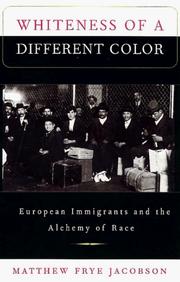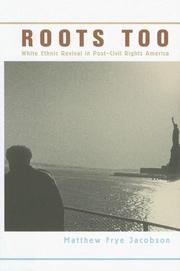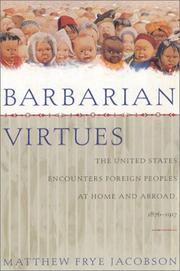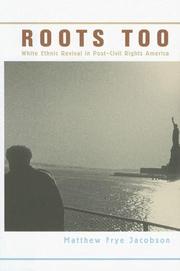| Listing 1 - 10 of 11 | << page >> |
Sort by
|

ISBN: 9780674951914 0674063716 0674951913 9780674063716 Year: 1998 Publisher: Cambridge, Mass. London Harvard University Press
Abstract | Keywords | Export | Availability | Bookmark
 Loading...
Loading...Choose an application
- Reference Manager
- EndNote
- RefWorks (Direct export to RefWorks)
"America's racial odyssey is the subject of this work of historical imagination. Matthew Frye Jacobson argues that race resides not in nature but in the contingencies of politics and culture. In ever-changing racial categories we glimpse the competing theories of history and collective destiny by which power has been organized and contested in the United States. Capturing the excitement of the new field of "whiteness studies" and linking it to traditional historical inquiry. Jacobson shows that in this nation of immigrants "race" has been at the core of civic assimilation: ethnic minorities in becoming American were reracialized to become Caucasian. He provides a counterhistory of how nationality groups such as the Irish or Greeks became Americans as racial groups like Celts or Mediterraneans became Caucasian." "Jacobson tracks race as a conception and perception, emphasizing the importance of knowing not only how we label one another but also how we see one another, and how that racialized vision has largely been transformed in this century."--Jacket
European Americans --- Race identity --- Whites --- United States --- Immigrants --- History --- Racism --- Race relations --- #SBIB:39A6 --- #SBIB:97G --- Ethnology --- Europeans --- Etniciteit / Migratiebeleid en -problemen --- Geschiedenis van Noord-Amerika --- Race relations. --- Race question --- White people --- White persons --- Caucasian race --- Américains d'origine européenne --- Einwanderer. --- Ethnische Identität. --- Europeanen. --- Geschichte. --- Immigranten. --- Immigrants. --- Race discrimination --- Race discrimination. --- Race. --- Racial Groups. --- Racism. --- Racisme --- Rassenfrage. --- Rassenvraagstuk. --- Wei�e. --- Identité ethnique. --- Race identity. --- Histoire --- USA. --- United States. --- Verenigde Staten. --- États-Unis --- Relations raciales.

ISBN: 0674039068 9780674039063 0674027434 9780674027435 0674018982 9780674018983 Year: 2009 Publisher: Cambridge, MA
Abstract | Keywords | Export | Availability | Bookmark
 Loading...
Loading...Choose an application
- Reference Manager
- EndNote
- RefWorks (Direct export to RefWorks)
In the 1970's, white ethnics mobilized around a new version of the epic tale of plucky immigrants making their way in the New World through the sweat of their brow. Although this turn to ethnicity was for many an individual search for familial and psychological identity, Roots Too establishes a broader white social and political consensus arising in response to the political language of the Civil Rights movement.
Whites --- Ethnicity --- White people --- White persons --- Ethnology --- Caucasian race --- Ethnic identity. --- Sociology of minorities --- National movements --- United States --- United States of America

ISBN: 0674831853 9780674831858 Year: 1995 Publisher: Cambridge, Mass. Harvard University Press
Abstract | Keywords | Export | Availability | Bookmark
 Loading...
Loading...Choose an application
- Reference Manager
- EndNote
- RefWorks (Direct export to RefWorks)
Sociology of minorities --- Migration. Refugees --- History of North America --- Jewish religion: persons --- Ireland --- Poland --- United States --- Immigrants --- Irish --- Jews --- Polish people --- 820 Internationale Betrekkingen --- 841.5 Bestuur en beleid --- 844.1 Minderheden --- 845 Religie --- 846 Identiteit --- 860 (Vredes)cultuur --- 882.4 Noord-Amerika --- 883.4 West-Azië --- 884.1 Oost-Europa --- 884.2 Noord-Europa --- Poles --- Ethnology --- Irishmen (Irish people) --- Emigrants --- Foreign-born population --- Foreign population --- Foreigners --- Migrants --- Persons --- Aliens --- Political activity --- History --- Politics and government --- United States of America

ISBN: 9780809016280 Year: 2001 Publisher: New York Hill and Wang
Abstract | Keywords | Export | Availability | Bookmark
 Loading...
Loading...Choose an application
- Reference Manager
- EndNote
- RefWorks (Direct export to RefWorks)
Book
ISBN: 1501333356 1501333348 Year: 2019 Publisher: London ; New York : Bloomsbury Academic,
Abstract | Keywords | Export | Availability | Bookmark
 Loading...
Loading...Choose an application
- Reference Manager
- EndNote
- RefWorks (Direct export to RefWorks)
"When 20-year-old Odetta Holmes - classically trained as a vocalist and poised to become 'the next Marian Anderson' veered away from both opera and musical theater in favor of performing politically charged field hollers, prison songs, work songs, and folk tunes before mixed-race audiences in 1950s coffee houses, she was making one of the most portentous decisions in the history of both American music and Civil Rights. Released the same year as her famous rendition of 'I'm on My Way' at the March on Washington, One Grain of Sand captures the social justice project that was Odetta's voice. 'There was no way I could say the things I was thinking, but I could sing them,' she later remarked. In pieces like 'Moses, Moses,' 'Ain't No Grave,' and 'Ramblin' Round Your City,' One Grain of Sand embodies Odetta's approach to the folk repertoire as both an archive of black history and a vehicle for radical expression. For many among her audience, a song like 'Cotton Fields' represented a first introduction to black history at a time when there was as yet no academic discipline going by this name, and when history books themselves still peddled convenient fictions of a fundamentally 'happy' plantation past. And for many among her audience, black and white, this young woman's pride in black artistry and resolve, and her open rage and her challenge to whites to recognize who they were and who they had been, too, modeled the very honesty and courage that the movement now called for"--Bloomsbury Publishing.
Folk music --- Folk songs --- African Americans --- Civil rights movements --- History and criticism. --- Music --- History --- Odetta,

ISBN: 9780674039063 9780674018983 Year: 2009 Publisher: Cambridge, Mass. Harvard University Press
Abstract | Keywords | Export | Availability | Bookmark
 Loading...
Loading...Choose an application
- Reference Manager
- EndNote
- RefWorks (Direct export to RefWorks)
Book
ISBN: 9798890855916 1469649675 1469649683 9781469649672 9781469649689 9781469649665 1469649667 Year: 2019 Publisher: Chapel Hill [Durham]
Abstract | Keywords | Export | Availability | Bookmark
 Loading...
Loading...Choose an application
- Reference Manager
- EndNote
- RefWorks (Direct export to RefWorks)
Between 2009 and 2013, as the nation contemplated the historic election of Barack Obama and endured the effects of the Great Recession, Matthew Frye Jacobson set out with a camera to explore and document what was discernible to the 'historian's eye' during this tumultuous period. Having collected several thousand images, Jacobson began to reflect on their raw, informal immediacy alongside the recognition that they comprised an archive of a moment with unquestionable historical significance. This book presents more than 100 images alongside Jacobson's recollections of their moments of creation and his understanding of how they link past, present, and future. The images reveal diverse expressions of civic engagement that are emblematic of the aspirations, expectations, promises, and failures of this period in American history.
Documentary photography --- Street photography --- Obama, Barack. --- United States --- History

ISBN: 9780816641253 Year: 2006 Publisher: Minneapolis London University of Minnesota Press
Abstract | Keywords | Export | Availability | Bookmark
 Loading...
Loading...Choose an application
- Reference Manager
- EndNote
- RefWorks (Direct export to RefWorks)

ISBN: 0674018982 9780674018983 9780674027435 0674027434 0674039068 Year: 2006 Publisher: Cambridge, Mass. London Harvard University Press
Abstract | Keywords | Export | Availability | Bookmark
 Loading...
Loading...Choose an application
- Reference Manager
- EndNote
- RefWorks (Direct export to RefWorks)
In the 1970's, white ethnics mobilized around a new version of the epic tale of plucky immigrants making their way in the New World through the sweat of their brow. Although this turn to ethnicity was for many an individual search for familial and psychological identity, Roots Too establishes a broader white social and political consensus arising in response to the political language of the Civil Rights movement.
Whites --- Ethnic identity. --- United States --- Ethnic identity --- 71.37 ethnic groups. --- Blanken. --- Ethnische Identität. --- Etnische identiteit. --- Weiße. --- White people --- Race identity. --- USA. --- United States. --- Sociology of minorities --- National movements --- United States of America --- Ethnicity

ISBN: 0520233425 9780520233423 Year: 2002 Publisher: Berkeley [etc.] University of California Press
Abstract | Keywords | Export | Availability | Bookmark
 Loading...
Loading...Choose an application
- Reference Manager
- EndNote
- RefWorks (Direct export to RefWorks)
Immigrants --- United States --- History --- 19th century --- Jews --- Politics and government --- Political activity --- Irish (Nation) --- Poles (Nation) --- Irish --- Polish people --- Politics and government.
| Listing 1 - 10 of 11 | << page >> |
Sort by
|

 Search
Search Feedback
Feedback About UniCat
About UniCat  Help
Help News
News